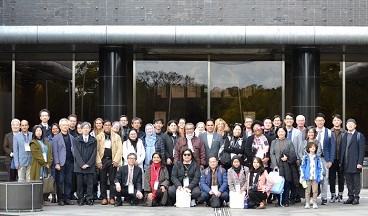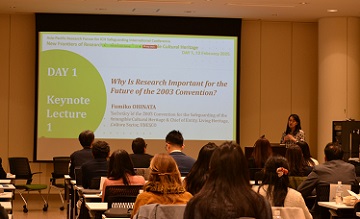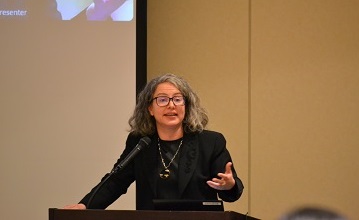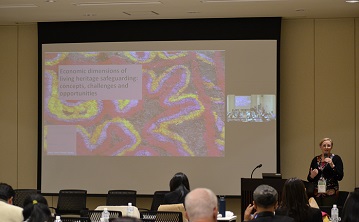NEWS
13/03/2025
International Conference ‘New Frontiers of Research for Safeguarding Intangible Cultural Heritage’ held at the National Museum of Ethnology (13–15 February 2025)
As part of the project ‘Asia-Pacific Research Forum for ICH Safeguarding’ (FY2022–2026), the international conference entitled ‘New Frontiers of Research for Safeguarding Intangible Cultural Heritage’ was held from 13 to 15 February 2025, at the National Museum of Ethnology in Osaka, Japan.
The three-day conference introduced and discussed a wide range of ‘new frontiers’ in Intangible Cultural Heritage (ICH) research. The programme consisted of a keynote lecture each morning, followed by themed sessions. Approximately 50 participants, including speakers selected through an open call, gathered at the venue each day for lively discussions. The full program and abstracts of the presentations are available here.
The first day began with a keynote lecture by Ms Fumiko Ohinata (Secretary of the Convention for the Safeguarding of the Intangible Cultural Heritage/Living Heritage Entity, Culture Sector, UNESCO) titled ‘Why Is Research Important for the Future of the 2003 Convention?’. She emphasized that strengthening research approaches that respect communities has led to greater recognition and more effective safeguarding efforts. Then, Session 1 (ICH Transmission and Pedagogies) focused on the transmission of living heritage, considering two distinct perspectives—the protection of indigenousness and the social identity of local communities. In Session 2 (Community Empowerment and Inclusivity), the presenters and the audience explored topics such as the scope of the term ‘community’, new aspects of faith tourism and the impact of UNESCO ICH inscriptions on local communities, and discussions continued informally at the evening reception.
On the second day, Ms Michelle Stefano (American Folklife Center, Library of Congress) delivered a keynote lecture titled ‘What Is ‘ICH’ Being Safeguarded Against? Shifting Priorities of Policy and Practice for the Present’. Using the Community Collection Grants as an example, she demonstrated how external organizations can collaborate with and support communities in protecting their cultural heritage. In Session 3 (Migration and Displacement), three presenters discussed the personal and social relationships between displaced individuals and intangible cultural heritage (ICH), as well as the legal frameworks for protecting cultural identity in migration contexts. In the afternoon, a special session was held as part of the Publication Programme for Early Career Researchers, launched in October 2024 under IRCI’s Research Forum project. Seven early-career researchers participating in the program made presentations. For some, it was their first time presenting at an international academic conference, but all participants spoke confidently and engaged in the subsequent Q&A sessions.
The final day began with a keynote lecture by Ms Harriet Deacon (Centre of Excellence for Data Science, Artificial Intelligence and Modelling/Wilberforce Institute, University of Hull), titled ‘Economic Dimensions of Living Heritage Safeguarding: Concepts, Challenges and Opportunities’. She discussed the development of UNESCO’s guidance note for addressing the risk of decontextualization and over-commercialization of ICH. She emphasized that balancing economic development with safeguarding efforts requires broad and comprehensive perspectives. In Session 4 (Legal Framework for ICH and SDGs), three speakers explored topics such as intellectual property rights and community rights in relation to ICH. In Session 5 (ICH and New Technologies) in the afternoon, presenters shared case studies on language preservation and traditional craftsmanship, examining both the potential for more efficient use of IT and concerns about the sustainability of IT infrastructure and the impact on traditional manual techniques.
The three-day conference concluded with a comprehensive discussion on future directions for New Frontiers in ICH research. Mr Christopher Ballard (Australian National University), who co-moderated with Ms Yoko Nojima (IRCI), noted that the conference had presented diverse possibilities for future research. He summarized the significance of ICH research by highlighting a few key points: the importance of understanding the process of heritage transmission, rather than focusing solely on documentation; the transdisciplinary or anti-disciplinary nature of ICH research and the need for further communication among diverse fields; and the growing significance of climate change as an ICH research topic. Following this, participants also commented on key takeaways, such as the positioning of expertise between heritage practitioners and researchers, as well as the increasing need for greater diversity in research contributors and approaches and international collaboration.
This was our first in-person international conference held on this scale since the COVID-19 pandemic. Over the course of three days, the event ran smoothly, with an additional 86 participants from 17 countries joining online. A publication compiling the conference keynote lectures and presentations is planned for the next fiscal year.

Group photo of the international conference on 13 February 2025 in front of the National Museum of Ethnology

Keynote speech of the international conference, Day 1 by Ms Ohinata on 13 February 2025 at National Museum of Ethnology

Keynote speech of the international conference, Day 2 by Ms Stefano on 14 February 2025 at National Museum of Ethnology

Keynote speech of the international conference, Day 3 by Ms Deacon on 15 February 2025 at National Museum of Ethnology
- ARCHIVE
- CATEGORY
- Research Data Collection
- Creation of Research Forum
- SDGs
- Climate change
- Natural hazards
- COVID-19 Pandemic
- Endangered ICH
- Post-conflict
- Legal systems
- Documentation
- Conferences/Meetings
- Seminars
- Symposiums/Forums
- Workshop/Working sessions
- Field research
- Information
- Visits
- Publications
- YouTube
- C2Centre
- UNESCO
- Cooperation-with-Sakai-city
- Governing Board Meetings
- Others



